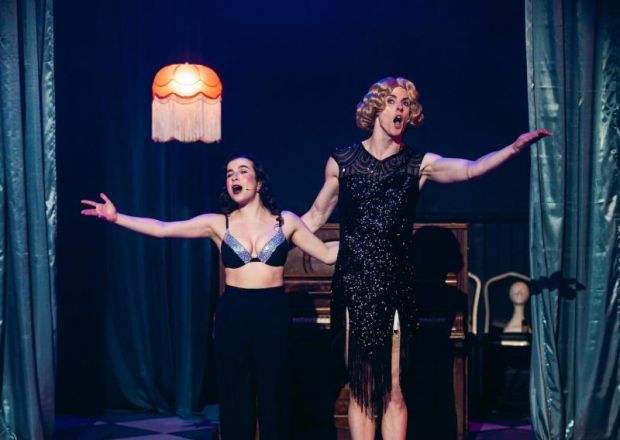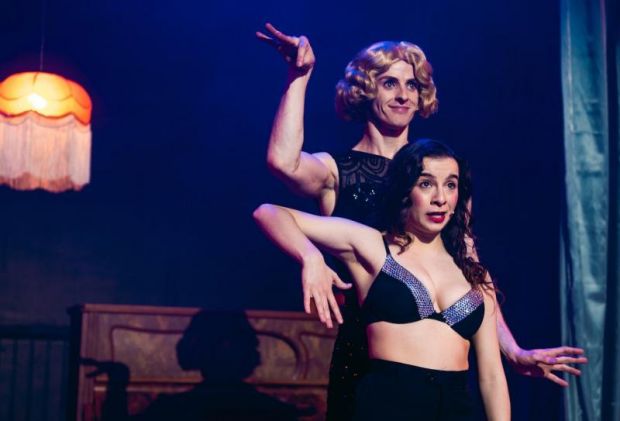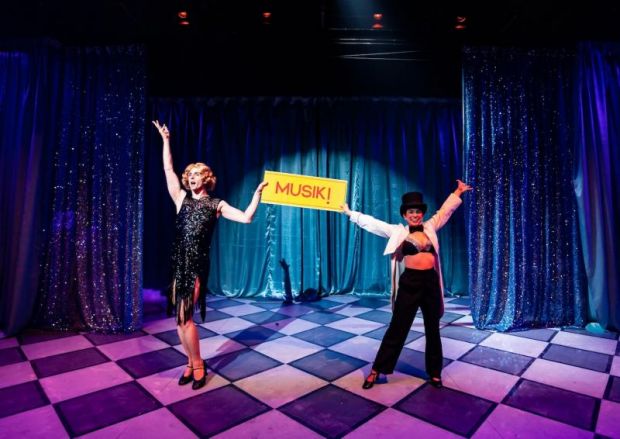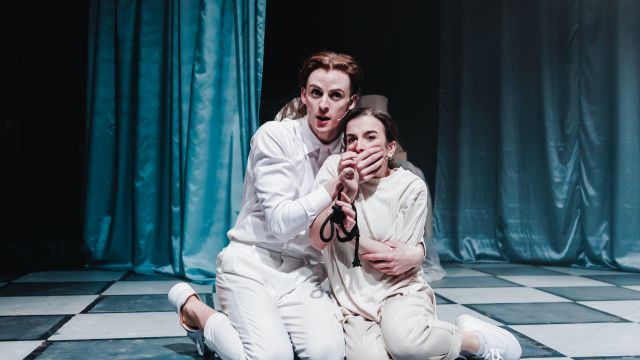Senser
The lights go down and then, suddenly, there’s a glamorous 1930s drag queen Cabaret Performer (Adam Noviello) in the spotlight - tight blonde curls and a clinging, shimmering green dress. She dances, she sings a naughty, bouncy Weimar- style cabaret song. Who is she? Where has she come from?
Then it’s 2043 – a grey, dystopian authoritarian world in which, we might infer, all pleasure is banned . A cheeky, sneakily rebellious Young Woman (Luisa Scrofani) is on the street, running late; she’ll miss curfew – again. Threatening PA systems warn citizens to return to their homes. Sirens wail. Caught out, our heroine is reprimanded by a bullying government Officer (Adam Noviello again – now in a sort of white suit). We sense that his strict, mean disciplinarian routine is a front, an act… Does he have a secret? Yes. As we’ll discover. He has inherited stuff from the past, forbidden stuff – including sheet music.

But the totalitarian government has banned music. Any and all music. Music, of course, is a metaphor; here it’s more than just music; it represents the human spirit, individuality, soul, and creativity – all of which must be controlled.
Offenders, we’ll learn, are burned alive. So, our Young Woman has never known ‘music’ – except that she does somehow dimly know that her father wrote a song for her… before he ‘disappeared’. Picking out some scarcely remembered notes on an old piano, she releases a kind of genie. And it is the Cabaret Performer, camp as can be, who will push, persuade, aid, and advise the Young Woman to find her music, the music that is in all of us, the music that’s there and cannot be suppressed.

And that is what Senser is about. Jess Newman wrote the play’s songs (one written with Brittanie Shipway) and music and they’re bright and just right for the story and its two time frames. Designer Grace Deacon’s floor to ceiling curtains and Aron Murray’s lighting give us the empty streets, the Officer’s junk strewn hideaway, the cabaret venue. David Youings’ excellent sound design creates the sirens and vehicles of a whole world of menace outside.
A seasoned music theatre performer, Luisa Scrofani’s stage presence engages the audience at once; she has a vitality and a vulnerable naiveté at the same time. We’re surprised, almost shocked but also delighted when her character ‘finds her music’ within herself - and a whole lot more. It’s a vindication, it’s a triumph: she knew there was something missing and now she finds it. Adam Noviello, also a music theatre performer (with quite a fan base, judging by opening night) must transition several times from stern and mean Officer to glitzy good time drag queen, but his apparent lack of conviction in the former role pays off. He has his music too – and it explodes out.

What weakens this otherwise entertaining, well realised show with its very good intentions is the concept itself. Not the idea of sensing and finding one’s music, but the somewhat forced or arbitrary combination of elements. I infer from the program notes that what we see on stage has had a lot of varied input. Perhaps too much – the reason why the elements don’t quite cohere? Why the cabaret of 1930s Berlin? It’s certainly fun, but does it make sense? Is the great risk of finding one’s music an end in itself? And after a distinctly downbeat but inevitable end to the story, why the tack-on that follows?
Leaving the theatre, having enjoyed the energy and talent of the performers, I appreciated the point, the important point that Shipway and director Miranda Middleton are making, but less so how they make it.
Michael Brindley
Photographer: Daniel Rabin
Subscribe to our E-Newsletter, buy our latest print edition or find a Performing Arts book at Book Nook.

